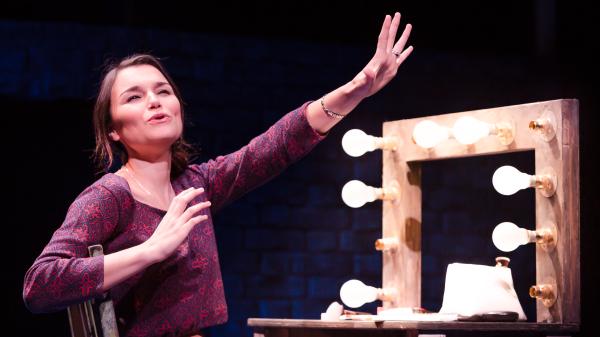The Last Five Years at the St James Theatre, SW1
an edited version of this review was published in The Times, 4 November 2016
In the late 1990s, Jason Robert Brown’s career as a composer took off. Parade, a musical about a Southern antisemitic lynching, won him a Tony award before he was 30. Meanwhile, his wife’s career as an actress stalled. Out of the wreck of their youthful marriage came The Last Five Years. If Brown thought it would make him look good, he failed.
At 85 minutes, The Last Five Years is barely a vignette of a chamber musical. It’s something of a cult among musical-theatre buffs due to its trick structure. Both protagonists tell their side of the story, each with alternating solos. Cathy starts, heartbroken, at the relationship’s end and takes us back in time, whereas Brown’s swaggering avatar, Jamie, sings a more predictable ballad from first love to last goodbye. They meet halfway through for a wedding duet.
In practice it’s gimmicky, especially with Derek McLane’s tacky sets flying in and out of the wings at every opportunity, a different plastic island for each number. A coherent design might have provided a necessary sense of unity. As a tale of a young couple driven apart by success, it’s also slight. Girls are naive, and men are cads. Go figure.
Where the St James Theatre has saved this production is with mega-powered casting. Jonathan Bailey, late of Broadchurch, is suitably charismatic as Brown’s poorly disguised “star novelist”, whose eye starts to rove just after marriage. Samantha Barks has the harder test, starting at emotional rock bottom and restoring a little more innocence with each number. She passes with flying colours.
This won’t surprise her admirers: Barks is the real deal, the only West End pro to fight her way from the Les Miserables stage cast into a movie otherwise populated by film stars. If she’s unconvincing, it’s only when Cathy complains of hordes of audition rivals ‘younger and thinner than me’. Watching the fragrant Barks, the rest of us mentally check the scales.
It’s typical of a show that screams “New York”: everyone is beautiful, earnest and cracking Jewish jokes. Yet even the charismatic Bailey can’t make Jamie likeable. The melodies deepen towards the show’s emotive end. A little late.







